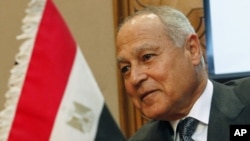Egypt's foreign minister is calling on the international community to provide financial assistance to help the country's economy recover after the protests that toppled President Hosni Mubarak.
Foreign Minister Ahmed Abul Gheit said Tuesday that Egypt's economy had been "gravely affected" by the political turmoil in the country. He called his diplomatic counterparts in the United States, Britain and Saudi Arabia and asked for aid. There was no immediate response from the three countries.
Strikes before and after Mr. Mubarak's resignation have crippled much of the nation's commerce. Thousands of government workers and those in industrial sectors have joined work stoppages calling for higher pay, better working conditions and ouster of corrupt union officials linked to Mr. Mubarak's rule. The strikes prompted the nation's stock exchange to once again postpone its reopening, this time from Wednesday to sometime next week.
The strikes were mostly halted on Tuesday, a Muslim holiday marking the birth of Prophet Mohammed. But the military rulers again called for an end to the labor unrest, saying the result of continued strikes would be "disastrous." The official MENA news agency quoted the military rulers as saying that the economic and social turmoil in Egypt could not be resolved until the strikes and sit-ins ended.
A French bank estimated that at the height of the two-plus weeks of anti-government protests, Egypt's economy was losing $310 million a day. Government officials and private analysts have subsequently said that the growth of the Egyptian economy this year – once projected at 6 percent – could to fall to 3.4 percent or less.
Despite the strikes and closure of popular tourist sites, one linchpin of the Egyptian economy – the Suez Canal – remained open during the unrest. But even it was closed for four hours Tuesday, when a ship ran aground before it was freed and operations resumed.
Egypt Seeks International Aid for Economy




